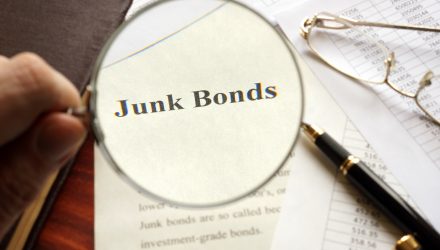Changes are coming for the SPDR BofA Merrill Lynch Crossover Corporate Bond ETF (NYSEARCA: CJNK).
Effective April 1, CJNK “will change its index strategy and name, and decrease its expense ratio by 25 basis points to provide investors with low cost, broad high yield exposure,” according to a statement from State Street.
CJNK, which debuted in June 2012, currently “seeks to provide exposure to corporate debt rated at levels where the lower end of investment grade debt and the higher end of high yield debt meet,” according to the issuer.
On April 1, CJNK will become the SPDR ICE BofAML Broad High Yield Bond ETF and start tracking the widely followed ICE BofAML US High Yield Index. The ETF’s ticker will remain the same, but its expense ratio will fall to 0.15% per year, or $15 on a $10,000 investment, making it the least expensive junk bond ETF on the market.
Changes For JNK, Too
CJNK will be a lower cost alternative to the SPDR Barclays High Yield Bond ETF (NYSEArca: JNK), the second-largest junk bond ETF. JNK, which is highly popular with institutional investors, will retain its annual fee of 0.40%.
JNK seeks to provide investment results that correspond generally to the price and yield performance of the Bloomberg Barclays High Yield Very Liquid Index, which is designed to measure the performance of publicly issued U.S. dollar denominated high yield corporate bonds with above-average liquidity.
Related: Quality Factor is Making Investors Take Note in 2019
On April 1, JNK will trade at a post-reverse split price of around $105, following a 1:3 reverse split. The higher trading price is expected to lower transaction costs for professional investors using JNK to get exposure to high-yield corporate debt.
“With over $400 billion in indexed fixed income assets and more than 100 fixed income professionals, we are a leader in fixed income investing. As such, we are continuously looking for opportunities to develop and refine solutions that better meet the needs of investors,” said Noel Archard, global head of SPDR product, in a statement. “JNK’s increased share price will appeal to investors who favor its large trading volumes and optionality, and with CJNK’s lower expense ratio and new index strategy, we are able to offer diversified, low cost exposure to investors who view high yield as a strategic asset class in buy-and-hold portfolios.”
For more information on the fixed-income space, visit our bond ETFs category.
The opinions and forecasts expressed herein are solely those of Tom Lydon, and may not actually come to pass. Information on this site should not be used or construed as an offer to sell, a solicitation of an offer to buy, or a recommendation for any product.

